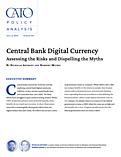Exploring the Risks of Central Bank Digital Currencies
Watch the Event

- 2x
- 1.75x
- 1.5x
- 1.25x
- 1x, selected
- 0.75x
- 0.5x
- Chapters
- descriptions off, selected
- captions settings, opens captions settings dialog
- captions off, selected
- en (Main), selected
This is a modal window.
Beginning of dialog window. Escape will cancel and close the window.
End of dialog window.
This is a modal window. This modal can be closed by pressing the Escape key or activating the close button.
This is a modal window. This modal can be closed by pressing the Escape key or activating the close button.
Join the conversation on X using #CatoEcon. Follow @CatoInstitute on X to get future event updates, live streams, and videos from the Cato Institute.
Featuring




Interest in central bank digital currencies (CBDCs) has dramatically increased over the past few years. What was once limited to passing ideas in academic papers has now become a leading policy discussion. Yet with it has also come a growing concern for the future of freedom. Will CBDCs spell doom for financial privacy? Do they pose a fundamental threat to the banking system? And how should policymakers think about the future of money?
The Cato Institute is pleased to welcome Representative Tom Emmer (R‑MN) to provide an opening address as the first member of Congress to introduce legislation prohibiting the Fed from launching a retail CBDC. Following Rep. Emmer’s address, Norbert Michel, vice president and director of the Center for Monetary and Financial Alternatives at Cato, will moderate a panel discussion with Greg Baer, Christina Skinner, Christian Kameir, and Nicholas Anthony. Come join us on March 9 for this important conversation.
Featured Study
Central Bank Digital Currency: Assessing the Risks and Dispelling the Myths
Central banks around the world are actively exploring central bank digital currencies (CBDCs). In fact, several central banks have now launched their own CBDC. Yet these efforts have struggled to gain traction among citizens. While CBDC proponents present many potential benefits, those benefits do not stand up to scrutiny. In short, these proponents fail to meaningfully distinguish CBDCs from the digital dollars that exist today. Yet CBDCs are not just a story of government waste or cronyism. While CBDCs don’t offer any unique benefits to the American people, they do pose serious risks to financial privacy and economic freedom. From expanding financial surveillance to destabilizing the financial system, CBDCs could impose enormous costs on U.S. citizens. Put simply, there is no reason for the federal government to issue a CBDC when the costs are so high and the benefits are so low. Congress should ensure that the federal government does not issue a CBDC.
Additional Resources

This work is licensed under a Creative Commons Attribution-NonCommercial-ShareAlike 4.0 International License.


